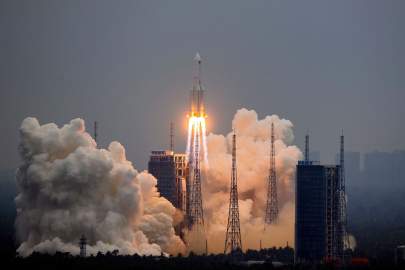Chinese Rocket Returns to Earth Over Indian Ocean

HONG KONG—Debris from a Chinese rocket re-entered Earth’s atmosphere over the Indian Ocean, Chinese officials said, easing days of anxiety that pieces would fall on densely populated areas.
The China Manned Space Engineering Office said the Long March-5B rocket made the re-entry at 10:24 a.m. Beijing time on Sunday. Most of the components of the rocket’s wreckage were burned up and destroyed during the re-entry, it said.
The rocket was sent into orbit to ferry a core component of its space station, the Tianhe module, on April 29. It was the first of a series of planned launches as China begins construction on the space station.
The rocket’s size, about the height of a 10-story building, and concerns from space-monitoring organizations that the entry back to earth wouldn’t be controlled caused worry in recent days, as various tracking organizations predicted potential landing sites covering swaths of the planet.
While there was a minuscule chance of the debris hitting populated areas, the episode has raised the issue of responsible space behavior, with China ramping up its space program and private corporations globally engaging in space activity.
Bill Nelson, who leads the National Aeronautics and Space Administration, criticized the re-entry on Saturday saying, “It is clear that China is failing to meet responsible standards regarding their space debris.”
China’s Foreign Ministry said Friday that the risks of harm were small. Spokesman Wang Wenbin said that authorities were watching the situation and that because the upper stage of this rocket had been deactivated, most of its parts would burn up upon re-entry, minimizing chances of damage to aviation or ground facilities and activities.
Among other space initiatives, China plans for its first permanent space base—the Tiangong space station—to be operational by next year. The space station is seen as a rival to the much larger International Space Station, and in the coming months, China is planning more launches to send cargo and crew to the Tianhe module that the rocket launched.
Photo: The Long March-5B rocket launch in April.
PHOTO: ZHOU JIAYI/XINHUA/ZUMA PRESS
Link: https://www.wsj.com/articles/chinese-rocket-returns-to-earth-over-indian-ocean-11620536102




